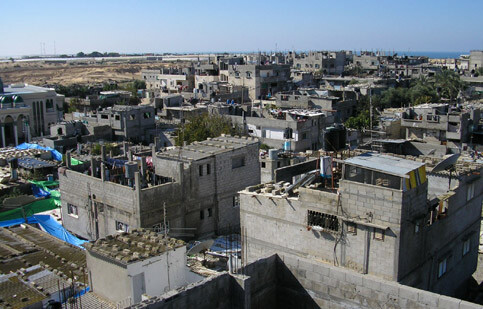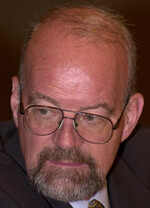The Electronic Intifada 18 January 2005

Khan Yunis refugee camp. On the edge of the camp, Israeli forces razed large areas of land. (Arjan El Fassed)
Peter Hansen, the Danish Commissioner-General of the United Nations Relief and Works Agency for Palestine (UNRWA), who will be leaving his position in March according to reports in the Danish media, spoke out about the conditions in Gaza, Palestine at a recent conference sponsored by the Faculty for Israeli-Palestinian Peace held in East Jerusalem.
According to Hansen, the situation in Gaza is so horrendous that without the help of bulldozers you couldn’t get through the debris and sand barriers thrown up to block traffic.

Peter Hansen
Though Hansen has been repeatedly denounced by Israel as an agent for Palestinian terrorist activities, despite denials and proof to the contrary, UNRWA’s Commissioner-General expressed concern for Israeli suffering.
“Never forget there are two parties to the conflict and there are two peoples exercising violence against one another and it follows that there are victims on the either side too,” he stated.
“Israelis have suffered –there are 1000’s and 1,000’s of families in Israel were persons have lost dear ones to terrorist attacks. There has been physical damage done in Israel too. And perhaps one of the worst damages that have been suffered by the Israeli people is the experience of going through the functions that are exercised by an occupation army,” Hansen emphasized.
“When I look at checkpoints and I see the treatment meted out to innocent women and children, who are Palestinians or whatever, trying to get through, I think that there is a great brutalizing factor in having young men and young women exposed to exercising the kind of discretionary power, and often cruelty, that they do at checkpoints,” he continued. “That’s a damage, of course, that is difficult to measure but it is one that I think, and many psychologists would agree with me, that it will affect and plague Israeli society for years to come once these duties at checkpoints and military occupation will cease with a solution whenever that may come.”
“Maybe it’s a good thing for the soldier’s mental state that they don’t think about what they are doing,” Hansen said. “It’s one thing to think about the pain of what you are doing and another to be suffering at the hands of those who are doing it. The excuse that an order is an order and we don’t think about it is one that soldiers of various stripes have used throughout history in some cases with worse moral consequences than others.”
Hansen went on to explain that despite occasional censure it is evident, based on the generosity of donor nations to UNRWA, that most of the world has a good understanding of what they are doing. Last year’s budget of $72 million was based on pledges from donors such as the United Arab Emirates, Denmark, Sweden, Luxembourg, Republic of Korea, Switzerland, Cyprus, Indonesia, Tunisia, Kuwait, Thailand, Norway, Bahrain, India, Austria, China, Ireland, Malaysia, the Netherlands, Japan, United States, Turkey, and the United Kingdom. The European Commission and The Observer for the Holy See also made a pledge. Hansen’s native Denmark pledged $7 million and the Netherlands $14 million.
According to Hansen, “We are the largest international humanitarian agency in terms of staff, education, health services, and social services. And I think our staff gets a good deal of well deserved recognition for all that. At the same time, there is probably no UN agency that is more maligned than UNWRA is and subject to more willfully distorted misrepresentations of what we are, most of which are so completely off the wall and so wild that they cannot be taken seriously by anybody except for small groups of fanatics who are ready to believe anything that they are told.”
Hansen also maintained that on the whole Americans are either misinformed or uninformed. Carefully choosing his words, he said that the United States is among the countries that has the best opportunity for learning about the work of UNRWA. “Maybe there are so many things competing for the attention of Americans that they don’t always give priority to the kinds of things that UNRWA is doing. I feel that many have a good understanding of it, but I would also be disingenuous if I didn’t say that most of these willful distortions seem to appear in the US and there are a surprisingly high proportion of people in the United States who are willing to accept them uncritically.”
UNRWA Commissioner- General Hansen was born June 1941 in Aalborg, Denmark. He completed graduate and postgraduate studies in political science at Arhus University in 1966 and joined the staff of the University as an Assistant Professor in International Relations. He began his career in the United Nation in 1978 as Assistant Secretary-General for Programme Planning and Coordination and rapidly advanced through a variety of positions. Hansen was appointed Commissioner-General of UNRWA by UN Secretary-General Boutros Boutro-Ghali in 1996.
Genevieve Cora Fraser is a poet, playwright and journalist as well as a long-standing environmental and human rights activist.
Related Links


